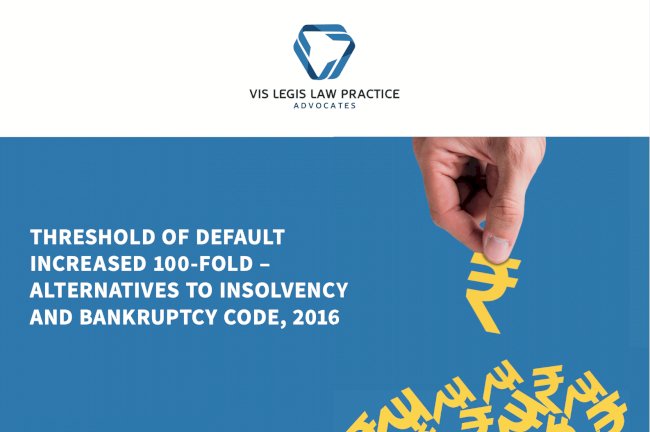PROCEDURE FOR RECOVERY OF DUE PAYMENTS UNDER MICRO, SMALL & MEDIUM ENTERPRISES DEVELOPMENT ACT, 2006
VLLP ARTICLE ON THE PROCEDURE FOR RECOVERY OF DUE PAYMENTS UNDER MICRO, SMALL & MEDIUM ENTERPRISES DEVELOPMENT ACT, 2006
PROCEDURE FOR RECOVERY OF DUE PAYMENTS UNDER MICRO, SMALL & MEDIUM ENTERPRISES DEVELOPMENT ACT, 2006
INTRODUCTION
At present majority of the businesses are passing through a tough time due to COVID – 19 situation, which has resulted into a total lockdown all over India. Due to the massive impact of COVID – 19, the Ministry of Corporate Affairs has issued a notification dated 24th March, 2020 (“Notification”) thereby increasing the minimum threshold for initiating Insolvency Resolution Process under the Insolvency and Bankruptcy Code, 2016 (“IBC”) against a defaulting party from Rs. 1 Lakh to Rs. 1 Crore, which means that post 23rd March 2020 for filing any claim before the National Company Law Tribunal (“NCLT”), the minimum value of the claim must be Rs. 1,00,00,000/- or above.
It is pertinent to note that even much prior to the Notification, the Insolvency Law Committee had mulled over increasing the aforesaid threshold in its Report of February 2020. In the Report, however, the threshold was advised to be revised to only Rs. 5,00,000/-. Thereafter, with the outbreak of Covid-19 and the ensuing lockdown and financial crisis, it was imminent that the Central Government introduced certain major reforms to safeguard the interests of businesses.
Prior to the Notification, the Hon’ble Minister of Finance had addressed the Nation and had explained that the intent behind the same was to protect the smaller businesses and particularly Micro, Small and Medium enterprises which will be facing financial difficulties leading to non - performance of contractual obligations by them in the present situation.
The Notification may provide a temporary relief to Micro, Small and Medium Enterprises (“MSMEs”), as considering the limited scale of their operations their defaults are likely to be less than Rs. 1 Crore. However, if the said Notification is made permanent, then it will also deprive Micro, Small and Medium Enterprises from approaching NCLT if the debt/outstanding amount owed to them is less than Rs. 1 Crore. While it is true that NCLT is not a court of recovery, it still proves to be an efficacious means to ensure that the defaulting party makes payment of the outstanding dues or agrees for a settlement. The said Notification further doesn’t clarify whether its application is prospective or retrospective and whether it a temporary or permanent amendment in IBC.
In view of the above, in cases where dues to be recovered by MSMEs are less than Rs. 1 Crore (which is quite common) the MSMEs will have to explore other means to recover their outstanding dues. The options available to them are filing a suit, approaching Micro and Small Enterprises Facilitation Council (“Council”) under Micro, Small & Medium Enterprises Development Act, 2006 (“MSMED Act”) or going for arbitration if the agreement so provides or if the parties so agree. In this article, we will discuss the procedural aspect provided under MSMED Act for resolving the dispute of non - payment of dues.
PROVISIONS OF THE MSMED ACT
In order to examine the procedure of approaching the Council under the MSMED Act, it is first essential to understand who can approach the council. Under the MSMED Act, the classification (w.e.f 1st July 2020) of Micro, Small and Medium Enterprises is as under:
- Micro Enterprise – where the investment in Plant and Machinery or Equipment does not exceed one crore rupees and turnover does not exceed five crore rupees;
- Small Enterprise – where the investment in Plant and Machinery or Equipment does not exceed ten crore rupees and turnover does not exceed fifty crore rupees;
- Medium Enterprise – where the investment in Plant and Machinery or Equipment does not exceed fifty crore rupees and turnover does not exceed two hundred and fifty crore rupees.
Sections 15, 16 and 17 of the MSMED Act provide that where any supplier supplies any goods or services to any buyer , the buyer shall make payment towards the same on or before the date agreed upon (which in no case shall be more than 45 days) or where there is no agreement, then on or before the appointed date i.e. before expiry of 15 days from the date of acceptance of the goods or services, failing which, the buyer shall be liable to pay compound interest with monthly rests to the supplier at three times the bank rate notified by the Reserve Bank.
The term “Supplier” has been defined under the MSMED Act as a Micro or Small Enterprise which has filed the memorandum of registration with the authority prescribed under the MSMED Act. It is pertinent to note that the definition of the term “Supplier” does not include a Medium Enterprise. Section 18 of the MSMED Act provides that any party to the dispute with regard to the amount due under Section 17 may make a reference to the Council. Since the terms used under Section 17 is “Supplier”, it is accordingly only a Micro or Small Enterprise that can approach the Council for resolution of dispute regarding non - payment of its dues.
The Micro or Small Enterprise will require a valid registration under the MSMED Act to apply to refer its disputes to the Council under MSMED Act. The Registration as a Micro, Small or Medium Enterprise is governed by Section 8 of the MSMED Act which provides that any enterprise seeking to be registered as Micro, Small or Medium Enterprise is required to file a memorandum to that effect in the manner as may be prescribed. While earlier physical filing of the memorandum and supporting documents was required, vide its Notification bearing Reference No. S.O. 2052 (E) dated 30th June 2017, the Ministry of Micro, Small and Medium Enterprises notified the new/updated procedure for filing the memorandum as referred in Section 8 of the MSMED Act.
The said Memorandum is called Udyog Aadhaar Memorandum and is to be filed in Form I, online on the website https://udyogaadhaar.gov.in/UA/UAM_Registration.aspx. The form requires basic information like Aadhaar no., PAN, bank account details of the applicant, investments in plant and machinery etc. The procedure is fairly simple and all the documents to be uploaded are only to be self- certified thereby removing the difficulty of obtaining certification from any external body of authority.
In order to facilitate convenient access of Micro and Small enterprises to the Council, the Ministry of Micro, Small and Medium Enterprises had developed an online portal called MSME Samadhan Portal (https://samadhaan.msme.gov.in/) on which Micro and Small enterprises can file their applications online. The application once filed is automatically forwarded to the council having jurisdiction to preside over the application i.e., the Council within whose jurisdiction the supplier carries on business, irrespective of the location of buyer. It is, however, not compulsory for Mirco and small Councils to file the applications only through the Samadhan portal. The same can be done physically also.
Upon receipt of a reference, the Council follows the following procedure:
i. On receipt of the reference, the Council shall either conduct the conciliation itself or refer the matter for conciliation to any institution or center providing service of alternative dispute redressal and the same shall be governed by the provisions of the Arbitration and Conciliation Act, 1996.
ii. If the conciliation proceedings fail between the parties, the Council shall either conduct the arbitration itself for resolving the dispute or refer the matter for arbitration to any institution or center providing service of alternative dispute redressal and the same shall be governed by provisions of Arbitration and Conciliation Act, 1996.
iii. The Council is required to complete the arbitration within a period of 90 days.
If any party (not being a supplier) makes an application for setting aside any decree, award or other order made either by the Council itself or any institution or center before the court, such application shall not be entertained unless 75% of the amount in terms of the decree, award or any other order in is deposited in the Court. Also, pending the disposal of such application, the Court shall order such percentage of the amount deposited to be paid to the supplier, as it considers reasonable under the circumstances of case, subject to such conditions as it deems necessary to impose.
CONCLUSION:
Due to COVID – 19 situation and raise in the threshold under IBC, approaching the Council under the MSMED Act remains the most viable option for Micro and Small enterprises for recovery of amounts (of less than 1 Crore) due from the buyers of products or services. While a Micro or Small enterprise could also choose to file a suit, the same may take a few years to conclude. On the other hand the Council is a specialized authority set up for adjudicating disputes pertaining to Micro and Small enterprises in a time bound manner. Yet another benefit of approaching the Council for a Micro or small enterprise is that if the award/decree/order of the Council is challenged by the buyer then the buyer has to mandatorily deposit 75% of the amount of award/decree/order in the Court, which can further also be disbursed in such a ratio to the Micro or Small enterprise as the Court deems fit, thereby creating an impediment to the challenge. As an added advantage, the said condition of deposit is not applicable if a Micro or Small enterprise wishes to challenge the award/decree/order of the Council.
In many cases, it could so happen that the agreement between a Micro or Small enterprise with its buyer could contain an Arbitration clause appointing an Arbitrator or an Arbitration Institute to resolve the disputes between the parties. The Delhi High Court has clarified that even if the agreement provides for an Arbitration clause, the provisions of MSMED Act, being a special Act for Micro and Small enterprises will override the arbitration clause in the agreement. It may however, be borne in mind that while rendering this Judgement, the Delhi High Court was faced with a situation where the supplier had approached the Council and the buyer without having invoked the Arbitration under the agreement had challenged the award of the Council inter alia claiming that Arbitration clause as contained in the agreement ought to have been followed. If however, both the parties, vis. the supplier and buyer agree to follow the arbitration clause under the agreement, we see no impediment in doing so. In the same Judgment the Delhi High Court has also clarified that the condition of deposition 75% of the amount of award /decree/order of the Council by the buyer at the time of challenge is mandatory and non-negotiable.
The benefit of approaching the Council under the MSMED Act, is not available with a Medium enterprise, as the same is not included in the definition of the Term “Supplier”, as more particularly explained in the aforesaid paragraphs. The said position has also been affirmed by the High Court of Telangana and Andhra Pradesh. Accordingly, the options available to a Medium enterprise, should the dues recoverable by it are less than Rs. 1 Crore, is to file a Suit or go for Arbitration if the agreement so provides or the parties so agree.
To sum up, it can be concluded that while the increase in the threshold for approaching the NCLT may be a temporary relief, if the same continues as a permanent provision, it will act to the disadvantage of the Micro, Small and Medium enterprises. In fact under normal circumstances, a threshold of Rs. 1 crore would be considered quite high and was not even the intention as is more particularly borne out from the report of the Insolvency Law Committee. It could therefore be hoped and anticipated that the said upward revision is only temporary. If the same, however, continues, while the Micro and Small Enterprises will still have the option of approaching the Council, the Medium enterprises will be left to rely on more general modes of dispute resolution vis. Suits and Arbitrations, which are both time consuming and expensive.
Disclaimer: The content of this article is intended to provide a general guide to the subject matter and is not intended to be a legal opinion. Specific advice should be sought before taking any action for towards your specific circumstances.
Click Here To See More
Files
What's Your Reaction?




















